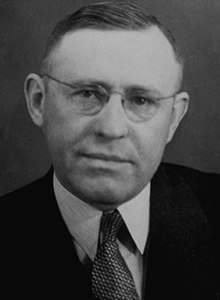Jesse Harper
 |
|
| Sport(s) | Football, basketball, baseball |
|---|---|
| Biographical details | |
| Born |
December 10, 1883 Paw Paw, Illinois |
| Died | July 1, 1961 (aged 77) Sitka, Kansas |
| Playing career | |
| Football | |
| 1905 | Chicago |
| Baseball | |
| 1903–1906 | Chicago |
| Coaching career (HC unless noted) | |
| Football | |
| 1906–1907 | Alma |
| 1909–1912 | Wabash |
| 1913–1917 | Notre Dame |
| Basketball | |
| 1910–1913 | Wabash |
| 1913–1918 | Notre Dame |
| Baseball | |
| 1914–1918 | Notre Dame |
| Administrative career (AD unless noted) | |
| 1913–1917 | Notre Dame |
| 1931–1933 | Notre Dame |
| Head coaching record | |
| Overall | 57–17–7 (football) 67–29 (basketball) 61–28 (baseball) |
|
College Football Hall of Fame Inducted in 1971 (profile) |
|
Jesse Claire Harper (December 10, 1883 – July 1, 1961) was an American football and baseball player, coach, and college athletics administrator. He served as the head football coach at Alma College (1906–1907), Wabash College (1909–1912), and the University of Notre Dame (1913–1917), compiling a career college football record of 57–17–7. Harper was inducted into the College Football Hall of Fame as a coach in 1971.
Harper was the head football coach at Alma College in Alma, Michigan. He held that position for the 1906 and 1907 seasons. His coaching record at Alma was 8–3–4.
Harper was the 18th head football coach at Wabash College in Crawfordsville, Indiana, and he held that position for four seasons, from 1909 until 1912. His coaching record at Wabash was 15–9–2.
Harper is most known for his coaching at the University of Notre Dame. His 1913 football squad posted a 35–13 win over Army, one that is regarded by most football historians as the game that put Notre Dame on the football map.
Harper stepped down as head football coach after the 1917 season and returned to ranching in his home state of Kansas. His ranch was not far from where Knute Rockne was killed in a 1931 plane crash. Harper accompanied Rockne's body on the train from Kansas back to South Bend, Indiana, for the funeral and burial. The University of Notre Dame immediately hired Harper to fill Rockne's role as athletic director, a position in which remained until 1934, when Elmer Layden became head football coach and athletic director.
...
Wikipedia
